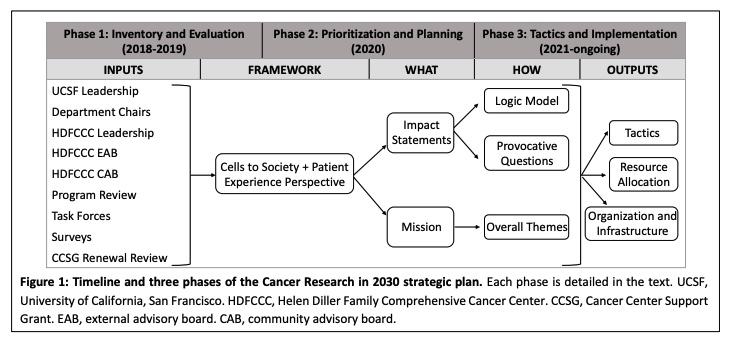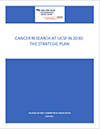In considering a new strategic plan, Senior Leadership of the Helen Diller Family Comprehensive Cancer Center (HDFCCC); the Director, Deputy Director, and nine Associate Directors) developed the theme of “Cancer Research in 2030:” that is, what will cancer research look like at UCSF in 2030? This forward-looking focus was intended to encourage creativity unconfined by a particular institutional structure or five-year grant mechanism. Furthermore, the motivation for this strategic planning was not in reaction to a specific problem to solve, but rather to think about where cancer research was going in the near future, and with this vision to define an overall scientific direction, mission, and priorities. Focusing on the science and not the requirements of a funding cycle paved the way for an innovative, actionable, and motivating strategic planning process.
This process led to the HDFCCC Research Mission Statement:
The UCSF Helen Diller Family Comprehensive Cancer Center (HDFCCC) seeks to drive scientific discovery and develop tailored interventions to improve cancer outcomes in the catchment area and beyond.This mission statement can further be deliniated into three major thematic areas:
- Theme 1 (Innovative Discovery): Advance innovative basic, clinical, and population research, focused on unique characteristics of the individual, disease, population, and community.
- Theme 2 (Effective Translation): Translate research to define risk, emphasize prevention, optimize diagnosis, tailor screening and treatment, and improve outcomes.
- Theme 3 (Implementation and Dissemination): Reduce inequities in cancer awareness, prevention, early detection and diagnosis, care, treatment, and patient-centered outcomes, through data-driven science and community engagement.
The HDFCCC Cancer Research in 2030 strategic planning process began in 2018 and was divided into three phases as shown below. For more information about the details of process and implementation, view the Strategic Plan online.

